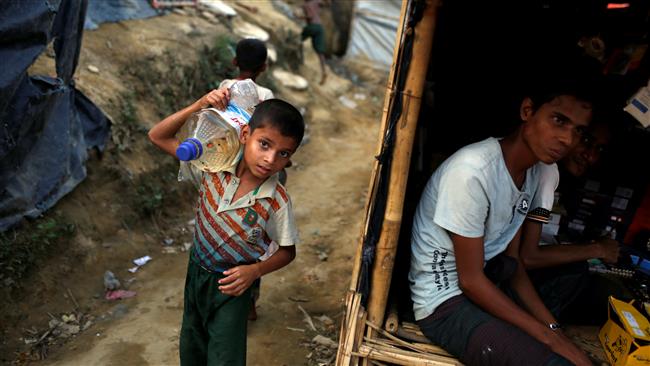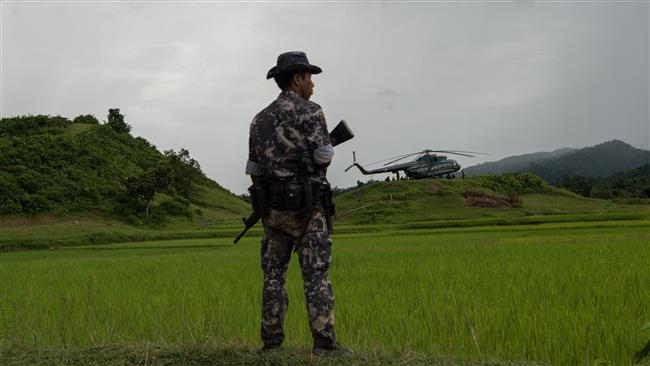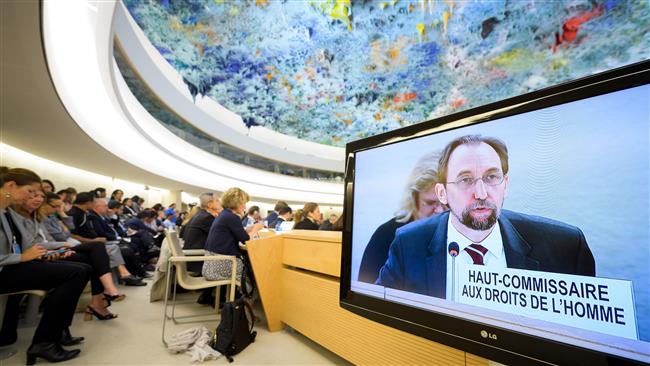Genocide against Rohingya systematic, state sponsored: Analyst
The head of the UK-based Islamic Human Rights Commission (IHRC) has described the genocide being committed against Rohingya Muslims in Myanmar as “a systematic policy,” criticizing the world community for remaining silent on the plight of the persecuted minority group.
“The reality is that this is a deliberately created crisis,” said Massoud Shadjareh during Press TV’s The Debate show on Friday. “It is a systematic policy which is being implemented in Myanmar, and all structures of Myanmar are involved in it: The so-called democratic government, the armed forces, the extremist Buddhists.”
He added that the ongoing crackdown against Rohingya Muslims, which the UN calls an ethnic cleansing campaign, targets “a whole group of people, who are even being denied of their right to citizenship.”
Shadjareh added that the result of such official government policy is that “thousands and thousands of people are being driven now out of their homes, because there’s a butchering of innocent people taking place and they have to run away.”
The analyst further highlighted the plight of those Rohingya Muslims who have not been able to escape the violence in Rakhine State.

The sufferings of the Rohingya Muslims who have managed to flee “is nothing in comparison to those who have been left behind, who are unable to move [since] they’re too old or don’t have the finances to pay people or traffickers to traffic them out of the area,” he said.
‘International community dragging its feet’
Emphasizing the need for immediate action to help the Rohingya refugees, Shadjareh added, “The international community is dragging its feet while people are dying in large numbers.”
He further said the Muslim refugees in Bangladesh urgently need protection, explaining that since the Myanmar government cannot be expected to provide such protection, “there has to be international troops, UN troops providing protection… you can’t leave people to be killed and tortured and disappear in this way.”
‘Yet another Holocaust taking place’
Pointing to the continued inaction of the international community on yet another case of a massive, state-sponsored genocide, Shadjareh said, “After the Holocaust, there were voices in the international community saying ‘never again’ we would allow this sort of thing to take place, but the Bosnia [massacre] happened, and we allowed it to take place in front of our eyes in the middle of Europe… we actually created the environment in which genocide could take place.”
He went on to explain, “We denied protecting Bosnian Muslims and we denied them the right of defending themselves… and now we see that a similar thing happening in Myanmar; we know it’s happening, we know how to stop it but there’s no political will to do so and this is actually very dark days for the humanity within the international context.”
Shadjareh blamed “the international community’s silence” for continued deaths in Myanmar, saying “it seems that everyone is waiting for the Myanmar government to finish up the job and completely, ethnically cleanse and commit the genocide and finish it, and this is outrageous.”
Also participating in The Debate was US-based columnist for The Hill news outlet, Brent Budowsky, who also described Myanmar’s continued persecution of its minority Rohingya Muslims as “tragic, illegal, brutal, disgusting, sickening, nauseating,” adding that “it must be stopped immediately.”

“I think there should be legal action taken in the international law for this outrageous violation of human rights,” Budowsky insisted.
International observer force needed
He further stated that the government and military of Myanmar “should be told categorically by all decent nations that there are going to be aggressive sanctions,” stressing the need for a UN peacekeeping or observer force to stop the carnage.
“It’s absolutely out of control,” the American journalist added, saying “it’s disgusting, it’s a stain on civilization… we’ve got to send in the doctors, the aid, the medicine, the food, to save the children and others from what is a stain on humanity that must be stopped now.”
He said the world’s silence on the Rohingya crisis is unjustifiable, adding, “I think we have to mobilize all the resources that decent people and decent countries can provide.”
Backed by Myanmar’s government and Buddhist majority, the military launched yet another heavy-handed crackdown against the Muslim minority in Rakhine State on August 25, using a number of armed attacks on military posts as the pretext.
Over that past three months, government troops, apart from raping, have been committing killings, making arbitrary arrests, and carrying out mass arson attacks to destroy houses in predominantly-Rohingya villages in Rakhine.
Only in its first month, the clampdown, called by the UN and prominent rights group an “ethnic cleansing campaign,” killed some 6,700 Rohingya Muslims, including more than 700 children, according to Doctors Without Borders.
More than 655,000 Rohingya Muslims have so far fled the predominantly-Buddhist Myanmar to neighboring Bangladesh since then.
‘Clock ticking’: UNRWA slams unjustifiable killing of children in Gaza
BP to be sued in Britain for supplying oil to Israel
VIDEO | Press TV's news headlines
Israeli strikes on north Gaza hospital ‘extremely dangerous, terrifying’: Director
VIDEO | Yemen targets Tel Aviv with Palestine 2 missiles
Pezeshkian: Iran resolved to complete North-South Transport Corridor
VIDEO | Iran-Syria: For Resistance
Qassam Brigades claims killing 3 Israeli troops in northern Gaza












 This makes it easy to access the Press TV website
This makes it easy to access the Press TV website